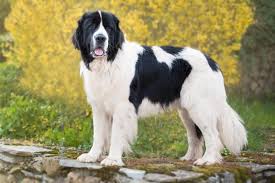
Landseer
Conditions of detention
Landseers are adaptable and can live in various environments, but they thrive best in homes with ample space to roam and play. They are well-suited for houses with large yards or proximity to water where they can swim.
Useful Fact: Due to their large size and exercise needs, Landseers are not ideal for apartment living. They need plenty of outdoor space and regular physical activity to stay healthy and happy.
Nutrition and diet
Landseers require a balanced diet rich in high-quality proteins, fats, and essential nutrients. High-quality commercial dog food or a well-balanced homemade diet is ideal.
Useful Fact: Due to their size, it’s important to monitor their food intake and provide meals that support their large build and high energy levels, while preventing obesity.
Health
Landseers are generally healthy but can be prone to certain genetic conditions such as hip dysplasia, elbow dysplasia, and heart issues. Regular veterinary check-ups are essential.
Useful Fact: With proper care and a healthy diet, Landseers can live an average lifespan of 8-10 years.
Grooming and care
Landseers have a thick, water-resistant double coat that requires regular grooming. Their coat is predominantly white with distinct black markings.
Useful Fact: Regular brushing, at least 2-3 times a week, helps manage shedding and keep their coat in good condition. Bathing should be done as needed, especially after swimming or outdoor activities.
Education and training
Landseers are intelligent and eager to please, making them relatively easy to train. They excel in obedience training and can be trained for water rescue work.
Useful Fact: Early socialization and positive reinforcement techniques work best with this breed, as they respond well to praise and rewards.
Toys and entertainment
These dogs enjoy toys that challenge their minds and bodies. Interactive toys, water toys, and activities like swimming and fetch are excellent for keeping them entertained.
Useful Fact: Landseers love water and can spend hours swimming, which is a great way to exercise them and keep them happy.
Safety
Landseers are friendly and generally get along well with other animals and people. However, due to their size, they should always be supervised around small children and unfamiliar animals to ensure safety.
Useful Fact: Early socialization helps Landseers become well-mannered and adaptable in various situations.
Accessories
Invest in a sturdy leash, a comfortable collar or harness, and a cozy bed. Landseers also benefit from having a variety of toys to keep them mentally stimulated.
Useful Fact: A high-quality, adjustable harness provides better control during walks and is more comfortable for the dog, especially given their large size.
Socialization
Early and ongoing socialization is crucial for Landseers to develop into well-rounded adults. Exposure to different people, animals, and environments is beneficial.
Useful Fact: Regular socialization helps reduce fearfulness and ensures they remain friendly and well-adjusted.
Travel and Transportation
Landseers generally travel well if properly acclimated. Use a secure crate or dog seat belt for car travel, and ensure they have access to water and regular breaks.
Useful Fact: Given their size, ensure your vehicle can accommodate a Landseer comfortably, especially for longer trips.
Behavior and psychology
Landseers are known for their gentle, intelligent, and loyal nature. They require mental and physical stimulation to stay happy and balanced. Without proper engagement, they may develop behavioral issues.
Useful Fact: Daily exercise and mental challenges can significantly improve their overall behavior and well-being.
Legal aspects
Check local regulations regarding dog ownership, as some areas may have specific laws concerning pet licensing and leash use. Licensing and regular vaccinations are usually required.
Useful Fact: Always keep your dog’s identification and vaccination records up to date to comply with local laws and ensure their safety.


